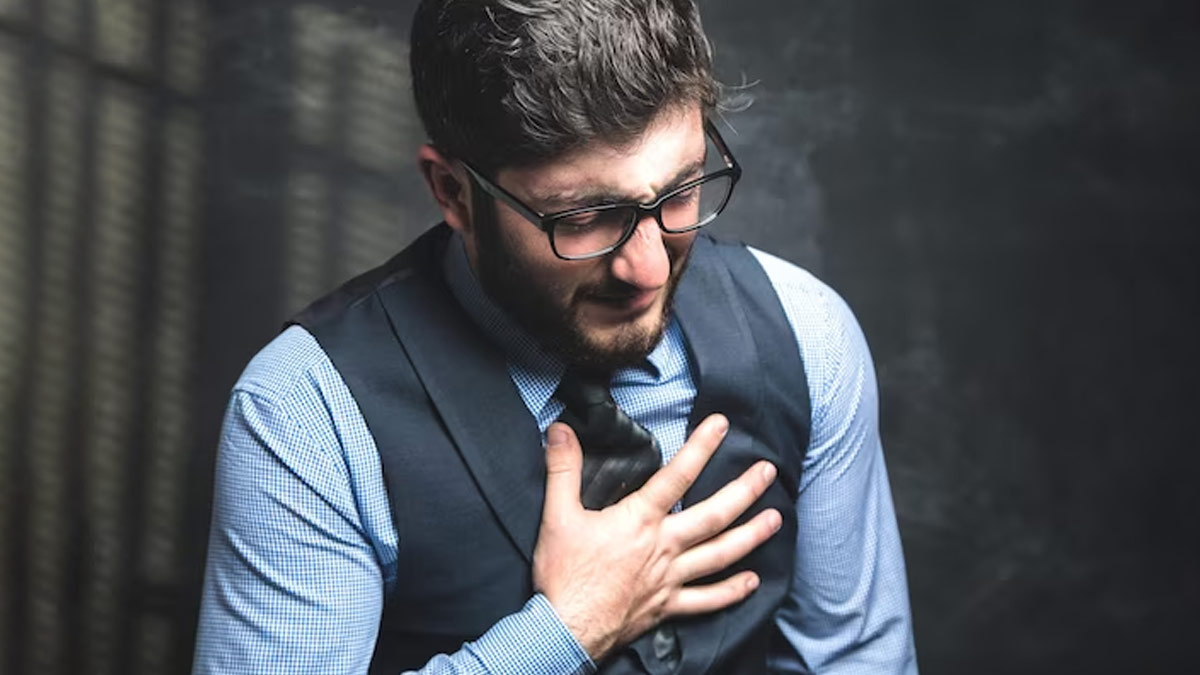
What does it mean when your heart suddenly starts racing, when you have pain in your chest, or start experiencing shortness of breath? Could it be a bout of anxiety or something more life-threatening like a heart attack? Speaking with the OnlyMyHealth team, Dr Vivudh Pratap Singh, Senior Consultant-Interventional Cardiology, Fortis Escorts Heart Institute, Okhla Road, New Delhi, discusses the difference between a heart attack-induced rapid heartbeat versus a temporary increase in heart rate.
Table of Content:-
Also Read: High Cholesterol: Factors That Can Increase 'Bad' Cholesterol In The Body
Different Causes Of Increased Heart Rate

Fast heart rate, also known as tachycardia, refers to a heart rate that is more than 100 beats per minute. According to the American Heart Association (AHA), increased heart rate can be your body’s response to common conditions. These include:
- Anxiety
- Fright
- Severe emotional distress
- Strenuous exercise
- Fever
- Some medicines and illegal drugs
- Pain
Less common causes may include:
- Anaemia
- Infection
- Increased thyroid activity
- Heart muscle damage from heart attack or heart failure
- Severe bleeding
- Very low blood pressure
- Lung disease
How Do You Know If It Is A Heart Attack?

Heart attack occurs when the blood flow to the heart is slowed down or blocked. It is among the most common causes of death worldwide. The World Health Organization (WHO) reported that an estimated 1.79 crore people died from CVDs in 2019, of which, 85% were due to heart attack and stroke.
An increased heart rate can signal a heart attack. According to Dr Singh, a racing heart rate is the body's "fight or flight" response to stress hormones. “In the case of a heart attack, a blockage in a coronary artery may result in the same symptoms including chest pain, rapid heartbeat, and breathlessness,” he said. “A heart attack is more likely to develop when the workload of the heart increases, for example while a person is running up the stairs, especially in people who do not routinely engage in physical exertion,” he added.
In addition, a heart attack continues for a longer period and may worsen over time, said Dr Singh, adding that a normal elevation in heart rate gradually subsides and resolves on its own within about 20 minutes.
It is also important to note that an elevated heart rate may not be a reliable sign of a heart attack. The Centers for Disease Control and Prevention (CDC) and American Heart Association (AHA), do not recognize heart rate elevation as a sign or symptom of a heart attack.
Also Read: Blurred Vision Can Be Due To Neurological Causes: Know What They Are
Symptoms Of Anxiety

Anxiety refers to an intense and persistent worry or fear that leads to various symptoms including:
- Nervousness, restlessness or tensed feeling
- Panic
- Increased heart rate
- Rapid breathing or hyperventilation
- Feeling weak or tired
- Trouble concentrating
- Sweating
- Trembling
- Trouble sleeping
- Gastrointestinal (GI) problems
The Importance Of Cardiopulmonary Resuscitation (CPR)
CPR is a lifesaving procedure performed when a person's heart stops beating or he/she starts experiencing cardiovascular events including cardiac arrest or heart attack. The method helps keep the blood flow active and improves a person's chance of survival. According to AHA, there are two versions of CPR:
CPR performed by trained individuals and healthcare providers: This includes conventional CPR using chest compressions and provides mouth-to-mouth breathing at a ratio of 30:2 compressions-to-breaths.
Compression-only CPR, or Hands-Only CPR: The general public can perform Hands-Only CPR, which is CPR without mouth-to-mouth breaths. It is recommended for use by people who see a teen or adult suddenly collapse in an out-of-hospital setting, such as at home, at work, or in a park.
Remember! Immediate action should be taken in the event of cardiac arrest, heart attack, heart failure, and stroke. While you must call for emergency help, you can buy some time with basic CPR. Recognise the symptoms early and prioritise regular health screening.
Also watch this video
How we keep this article up to date:
We work with experts and keep a close eye on the latest in health and wellness. Whenever there is a new research or helpful information, we update our articles with accurate and useful advice.
Current Version